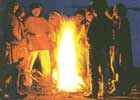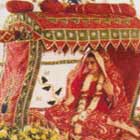In the North Makar Sankranti is called Lohri. Lohri marks the
culmination of winter, and is celebrated on the 14th day of January
a day before Makar Sankranti. Lohri is the time after which the
biting cold of winter begins to taper off. On this day the children go
from door to door to collect funds for community bonfires which are
lit in the evening.
For Punjabis, this is more than just a festival; it is also an example
of a way of life. Lohri celebrates fertility and the spark of life.
People gather round the bonfires, throw sweets, puffed rice and popcorn
into the flames, sing popular songs and exchange greetings.
An extremely auspicious day, Lohri marks the sun's entry in to the 'Makar
Rashi' (northern hemisphere). Across India, people celebrate the month
and the prodigious harvest it brings - Pongal in Tamil Nadu, Bihu in
Assam, Bhogi in Andhra Pradesh and the Sankranti in Karnataka, Bihar
and Uttar Pradesh.
The focus of Lohri is on the bonfire. It is also the one day when the
womenfolk and children get attention. Lohri is more of a community
festival, where the birth of a son or the first year of marriage is
celebrated with great fun and frolic. The first Lohri of a bride is
extremely important. The first Lohri of a newborn baby, whether a
girl or a boy, is also equally important.
Festivals and Fairs |
   |


